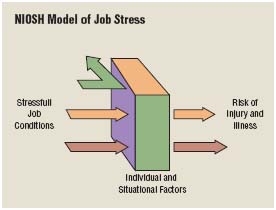What Is Stress?
Stress occurs when events in our lives cause us to feel excited, worried, depressed, or anxious. Our reaction to stressful situations has both physical and psychological elements. Many of these stem from an earlier time in human development when humans, like other animals, responded to unexpected events through instinct rather than reason. Scientists have categorized the usual animal responses to distressing situations as fight, flight, or freeze. Even after centuries of civilization, humans still react much the same way as animals to distressing situations. When something unsettling happens, our nervous system prepares to run away, fight back, or simply remain motionless in hopes of remaining unharmed.
Our nervous systems are hardwired to treat distressing events as life-threatening situations. Sometimes this is appropriate, but often it is not, and we may find ourselves overreacting to tense or worrisome situations because our automatic stress response cannot tell the difference between, for example, an attack by a wild animal and a disturbing interaction with a coworker. Many factors of modern life, such as family tensions, traffic jams, and financial worries, can trigger a stress reaction far beyond the actual threat involved. Once triggered, the fight, flight, or freeze reaction can be long lasting and hard to stop.
Why Is Stress Bad for Me?
When a stress response is triggered, your body undergoes a number of automatic reactions. Your brain releases hormones that raise your blood pressure, speed up your heartbeat, and heighten your awareness. Muscles become tense as your body prepares for action. Blood flow is directed toward the muscles needed for flight and away from digestive and immune systems. These responses allow the body to respond quickly and forcefully when necessary. They can be very helpful when quick action is called for and can prepare you for both crisis situations and the pressures of everyday life.
However, persistent stress can put a strain on your nervous system and can have damaging physical and psychological effects. Long-term stress can cause physical problems such as hypertension, heart attacks, and ulcers, as well as migraine headaches, digestive problems, and asthma. A number of severe emotional problems have been tied to stress, including depression, isolation, irritability, and drug and alcohol abuse. Some studies have shown connections between prolonged stress and dementia and Alzheimer's disease.
What Does Stress Management Mean?

Stress can cause problems in your daily interactions within social networks relating to school, family, friendships, and the workplace. Medical professionals and psychologists who study the negative effects of stress have promoted numerous ways of relieving stress and preventing its damaging symptoms. Because it is impossible to eliminate stressful situations altogether, experts have focused on developing methods of helping individuals manage or control their reaction to stress and reducing the detrimental effects of stress on your body.
Stress management involves not one process but rather a number of techniques through which you can learn to slow down the body's automatic stress response. Stress management techniques employ elements of science, fitness, and even spirituality. Principles of meditation, such as deep breathing and body relaxation, can be helpful, as can vigorous physical exercise. Several exercise and relaxation philosophies developed in Asia, such as qigong, tai chi, and yoga, have proved valuable in training the body to relax. Biofeedback is a medical treatment that uses electronic sensors to monitor body processes to help patients learn to control their responses. Prayer and laughter have also been found to reduce stress, and many groups teach these techniques as well.
What Are Some Causes of Stress on the Job?
Workplace stress can vary widely, depending on the individual. Some workers enjoy a fast-paced career, excel at multitasking
, and might feel stressed by a predictable routine. Others prefer a more relaxed schedule and would find dealing with daily crises nerve-racking. However, even a firefighter used to a high-stress environment may find a difficult relationship with a coworker highly stressful, and a factory worker, happy in a repetitive job, may react to a cut in pay with obsessive worry.
A 2005 survey about workplace stress by ComPsych, a provider of worker health resources, revealed that concerns over workload account for 46 percent of employee stress. Relationships with coworkers, the difficulties of balancing work and family life, and worry about losing a job are other major factors in workplace stress. Several studies have shown that stress levels may be related to the amount of control an employee has over his or her job, with those in demanding positions who have little power over their circumstances experiencing the highest degree of stress. Economic factors also contribute significantly to occupational stress, and job insecurity, debt, and money worries may increase dramatically during periods of recession
. Workplace diversity can also contribute to stress on the job, as employees of different genders, cultures, and ethnicities must learn to work together.
What Are Some Signs That Stress Is Becoming a Problem?
People may become so used to living with stress that they hardly notice it gradually increasing. Some individuals may unconsciously “manage” stress by using methods that only increase stress in the long run, such as alcohol and drugs, or they release pent-up emotion in angry outbursts. In order to determine whether stress is becoming a problem for you, first take an inventory of your physical and emotional health. A doctor's examination can help to determine if any symptoms you may have are the result of stress or have another medical cause.

Elizabeth Banks, as Beth, reacts to a stressful phone call in the film Role Models. NEW REGENCY PICTURES/THE KOBAL COLLECTION.
Physical symptoms of stress can include headaches, insomnia, exhaustion, stomach pains, and digestive problems. Back and neck pain, trembling of the lips and hands, and frequent colds or allergy attacks can also be caused by severe stress. Emotional symptoms of stress may include nervousness, crying spells, low self-esteem, and panic attacks. Workplace stress can have a number of far-reaching effects that can contribute to a downward spiral of stress that may negatively impact work performance. Stressed employees may find they are unable to perform their jobs and may become defensive, angry, and hopeless. Stress can interfere with your ability to make decisions, have satisfying relationships with your family and
friends, and deal with the everyday annoyances of life. One way to check out your level of stress may be to ask those close to you if they have noticed changes in your health or behavior.
What Can I Do during My Off Hours to Help with My Stress at Work?
In order to manage your stress at work, you must also examine stress in other aspects of your life. Relationships with friends and family, home maintenance, and paying bills can all be sources of stress, and an overall stress management program will help you reduce stress in every area of your life. Some communities offer classes in stress management techniques, and you may find it useful to learn several different methods and use a combination of them to control your symptoms. A basic overall stress reduction plan begins with a healthy lifestyle, including adequate sleep, a healthy diet, and regular exercise.


Stress can increase the likelihood for additional complications in the workplace such as increased risk of injury or illness. ILLUSTRATION BY LUMINA DATAMATICS LTD. © 2015 CENGAGE LEARNING®. U.S. Centers for Disease Control and Prevention, Department of Health and Human Services, National Institute for Occupational Safety & Health (NIOSH). “Stress…At Work.” Publication No. 99-101, 1999. http://www.cdc.gov/niosh/docs/99-101.

Learning to relax is just part of the solution to stress. You may also want to examine the causes of stress in your life. A journal can help you to monitor and analyze the aspects of your life that make you feel pressured and anxious. Can you eliminate any of them? If not, can you negotiate compromises with family members or coworkers to share some responsibilities? You may find you need to work on improving your communication skills in order to express your needs and work out solutions. Forming a reliable support network of people you can count on when you need a favor or a sympathetic ear will go a long way in relieving stress overload. Ultimately, you will never eliminate stress from your life, but you can learn skills and routines to help you negotiate stressful situations in a healthy way.
What Can I Do to Relieve Stress When I Am at Work?

Stress management can be beneficial to everyone on the job. You may want to approach your employer about promoting programs to reduce workplace stress. These can include the relaxation techniques mentioned above as well as classes in communications skills to improve worker interaction. Reduced stress in the workplace can improve productivity and profits as well as worker health and happiness.